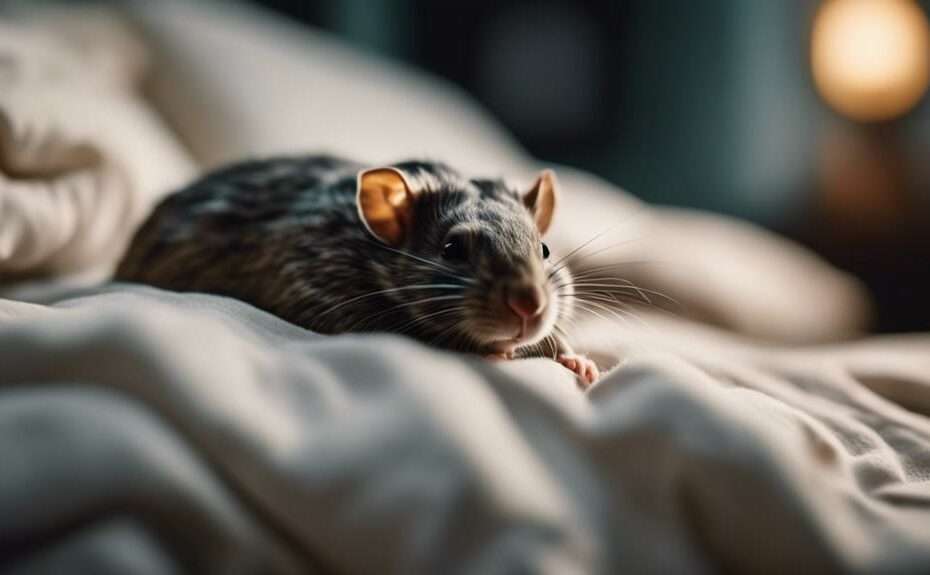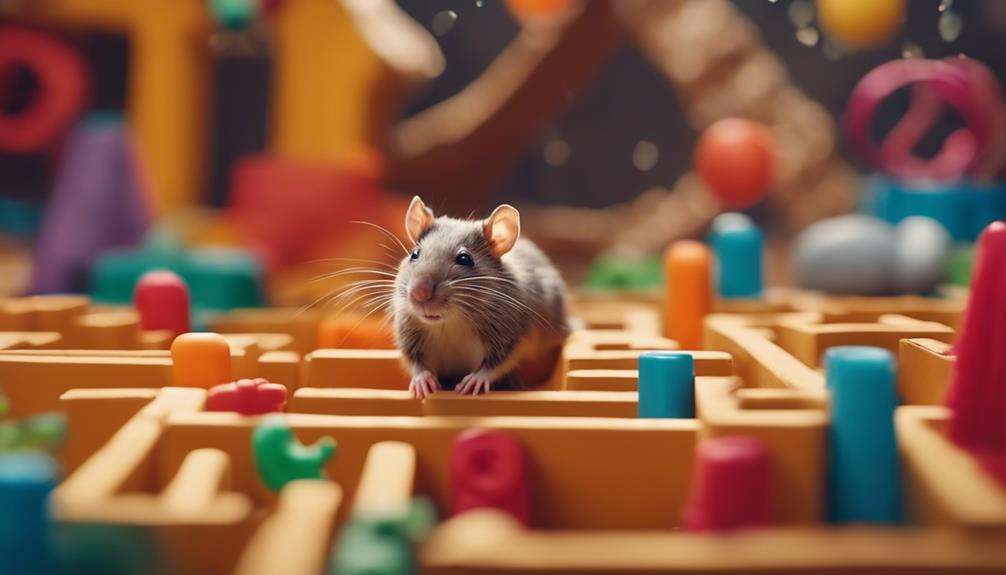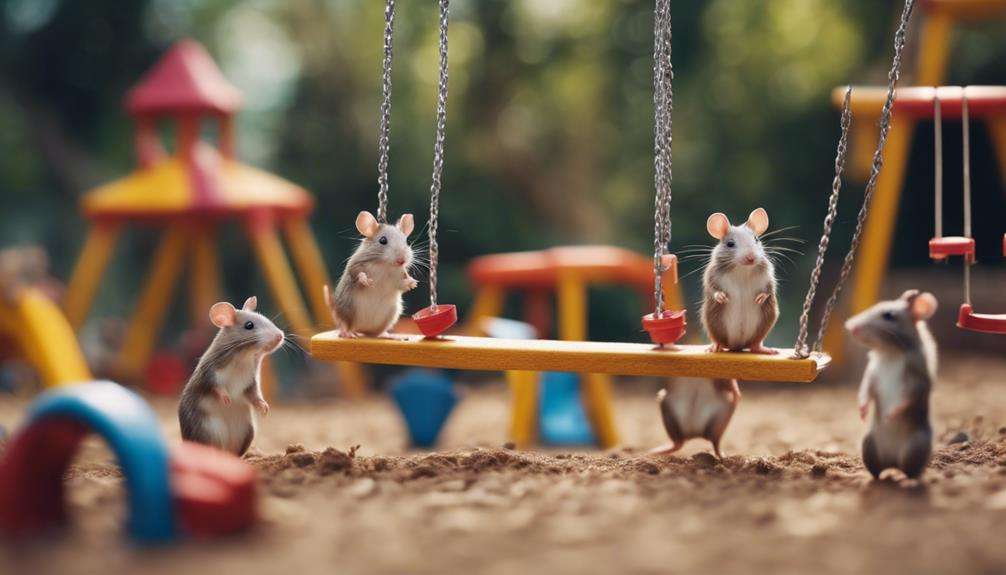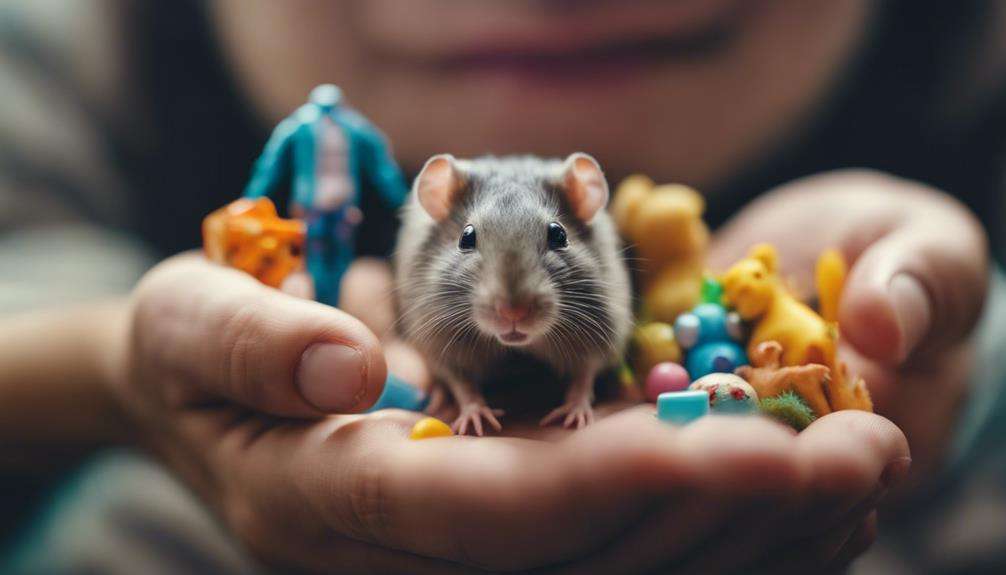Imagine a symphony of whispers and rustles echoing through tiny corridors; now, picture the impact of disruptive clamor in this delicate ecosystem.
Exotic pet rodents' noise levels hold a crucial key to their well-being and contentment. Understanding the significance of managing noise levels for these small creatures goes beyond mere tranquility; it can shape their health and interactions.
As you navigate the realm of exotic pet rodents, discover why their noise levels play a vital role in fostering a harmonious environment for these unique companions.
Key Takeaways
- Excessive noise harms exotic rodents' health and behavior.
- Rodent vocalizations convey emotions and communication needs.
- High noise levels lead to stress, anxiety, and health issues.
- Monitoring noise levels aids in early illness detection and well-being maintenance.
Noise Levels Impacting Rodent Well-being
Excessive noise levels significantly impact the well-being of exotic pet rodents, potentially leading to serious health concerns. Pet rodents are highly sensitive to their auditory environment, and loud noises can induce stress and anxiety, disrupting their normal behaviors and communication patterns. When exposed to high noise levels, these animals may experience changes in their sleep patterns, appetite, and overall well-being. The constant presence of loud sounds can even lead to increased aggression among pet rodents, further affecting their mental and physical health.
Due to their keen sense of hearing, pet rodents are easily disturbed by noisy environments. It's essential to monitor and minimize noise levels in their surroundings to ensure a stress-free and healthy life for these delicate creatures. By creating a quiet and peaceful space for exotic pet rodents, you can help prevent the negative impacts of excessive noise on their well-being and promote a harmonious living environment for these small companions.
Understanding Rodent Vocalizations
Understanding rodent vocalizations plays a crucial role in deciphering their emotional states and communication patterns. Pet rats, for example, utilize various vocalizations like chirping, chattering, or squeaking to convey different messages. These sounds can indicate contentment, fear, distress, or even pain. By paying attention to these vocal cues, owners and veterinarians can better understand the well-being of their rodent companions.
Respiratory sounds, such as wheezing or labored breathing, may signify underlying health issues that require prompt attention. Moreover, rodent vocalizations are also integral in social interactions, helping establish hierarchies, warn others of danger, and express mating behaviors. Being attuned to these communication patterns allows for a deeper connection with your pet rodent and enables you to provide appropriate care and support.
In essence, interpreting and responding to rodent vocalizations is essential for ensuring their welfare and overall quality of life.
Rodent Noise Communication Methods
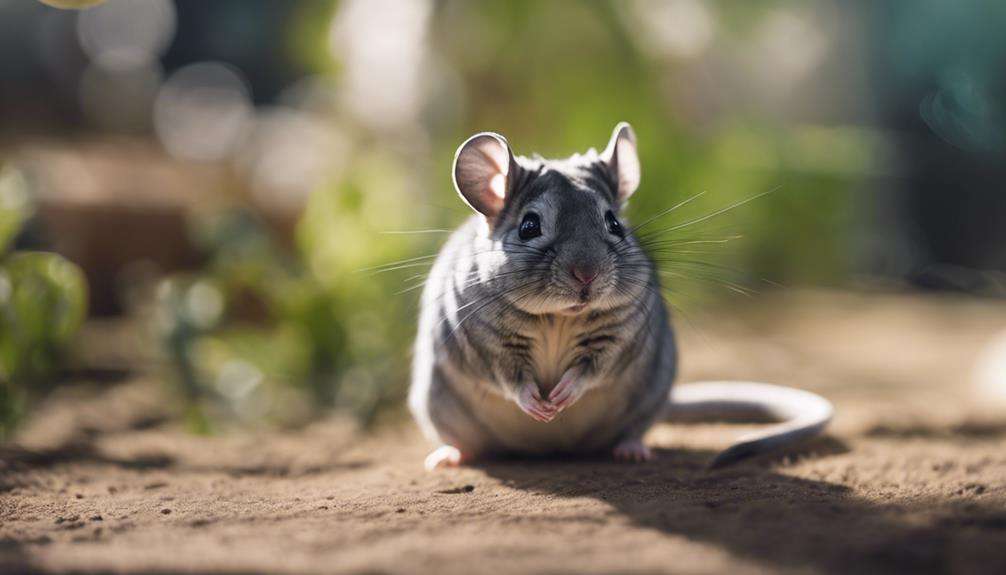
Exploring the diverse repertoire of vocalizations utilized by exotic pet rodents sheds light on their intricate noise communication methods and the insights they provide into the animals' well-being and social interactions.
- Ultrasonic Sounds: Rodents often use ultrasonic sounds that are beyond human hearing range to communicate, especially in situations like mating or distress.
- Chirping and Chattering: These noises are common when rodents are content or interacting socially with their cage mates.
- Bruxing: The grinding of teeth, known as bruxing, can indicate both pleasure and pain in rodents, making it a versatile vocalization to interpret.
- Squeaking: High-pitched squeaks may signal fear, pain, or territorial disputes among rodents, revealing important social dynamics within a group.
Understanding these vocalizations is crucial as changes in noise patterns could indicate underlying issues like respiratory disease, stress from inadequate hiding places, or disruptions in social hierarchies. Monitoring and interpreting these communication methods can provide valuable insights into the well-being and behavior of exotic pet rodents.
Impact of Noise on Rodent Behavior
Monitoring and managing noise levels is crucial for ensuring a comfortable and stress-free environment for exotic pet rodents, as it significantly impacts their behavior, causing stress, anxiety, and changes in activity levels. Excessive noise can lead to reduced exploration, feeding, and social interactions in pet rodents, affecting their overall well-being. Small rodents, such as rats, are particularly sensitive to loud or sudden noises, which can trigger fear responses and disrupt their normal behaviors. Inadequate noise control may result in respiratory distress and other health issues in these delicate creatures.
When handling rats or other small rodents, it's essential to consider the noise levels in their environment to prevent unnecessary stress and anxiety. Rodents have a keen sense of hearing, making a quiet and calm setting vital for their mental and physical health. By creating a peaceful atmosphere with minimal disturbances, pet owners can promote healthy behaviors and ensure the well-being of their exotic companion animals.
Rodent Noise and Human Interaction

Rodent noise levels play a significant role in shaping human interactions and the overall quality of shared living spaces. It emphasizes the importance of managing and understanding these sound levels for a harmonious environment. When considering pet rodents, commonly kept for companionship, it's essential to acknowledge the impact their vocalizations can have on human cohabitation. Here's why rodent noise and human interaction are crucial:
- Sleep Quality: Excessive noise from pet rodents can disrupt your sleep patterns, leading to potential health issues and decreased well-being.
- Relationships: High noise levels may strain relationships with neighbors or housemates, causing conflicts that could have been avoided.
- Well-being: Constant disturbances from loud pet rodents can negatively affect your overall mental and emotional state.
- Mitigation: Proper care, enrichment, and monitoring techniques can help reduce stress and excessive vocalizations in pet rodents. Investing time in creating a quieter living environment is a good idea.
Noise Levels in Exotic Rodent Species
When considering noise levels in exotic rodent species, it's crucial to understand their impact on the environment, behavioral implications, as well as health and stress factors.
Monitoring and interpreting the sounds these rodents make can offer valuable insights into their well-being and potential issues. Recognizing and addressing changes in noise patterns promptly can contribute to ensuring the optimal care and welfare of exotic pet rodents.
Impact on Environment
To ensure the well-being of exotic pet rodents, it's essential to consider the impact of noise levels on their environment.
Impact on Environment:
- High noise levels can increase stress and anxiety in exotic pet rodents.
- Loud noises may disrupt the sleep patterns of sensitive prey species like exotic rodents.
- Noise sensitivity varies among different exotic rodent species, necessitating individualized care.
- Maintaining a quiet and calm environment is crucial to reduce stress and promote the overall health of exotic pet rodents.
Ensuring a peaceful environment for exotic pet rodents is vital for their mental and physical well-being. By managing noise levels effectively, you can help create a harmonious living space for your beloved pets.
Behavioral Implications
Understanding the behavioral implications of noise levels in exotic rodent species is crucial for assessing their well-being and overall health.
In laboratory animals, such as exotic rodents, noise levels can have significant impacts on their respiratory and behavioral health. Unusual or excessive noise can induce stress, anxiety, or discomfort in these animals, leading to changes in their behavior patterns.
By monitoring and interpreting the noises made by exotic rodents, caregivers can detect early signs of potential health issues or environmental concerns. Proper attention to noise levels is essential for ensuring the welfare and proper care of these animals.
Therefore, a thorough understanding of the relationship between noise levels and behavioral implications in exotic rodent species is vital for maintaining their well-being.
Health and Stress
Monitoring the noise levels in the environment of exotic pet rodents is essential for safeguarding their health and well-being, particularly in relation to stress levels. Here are some key points to consider:
- High noise levels can lead to stress and anxiety in exotic pet rodents, impacting their overall health.
- Exotic rodents are sensitive to loud or sudden noises, which can trigger fear responses and increase stress levels.
- Chronic exposure to high noise levels can disrupt the sleep patterns of exotic pet rodents, leading to behavioral issues and health problems.
- Excessive noise can contribute to elevated cortisol levels in exotic pet rodents, compromising their immune system and making them more susceptible to illnesses.
Maintaining a quiet and peaceful environment is crucial for ensuring the respiratory health and overall well-being of these small creatures.
Managing Noise Levels in Rodent Habitats
Effectively managing noise levels in rodent habitats is essential for ensuring the well-being and comfort of exotic pet rodents. Even though laboratory rats can tolerate a small amount of noise, excessive or continuous loud sounds can have detrimental effects on their health and behavior.
To create a peaceful environment for your pet rodents, it's crucial to control noise factors such as loud music, sudden noises, or constant disturbances. High noise levels can lead to increased anxiety, decreased activity levels, and potential health issues in pet rodents. These disturbances can disrupt their normal behaviors, feeding patterns, and sleep cycles, impacting their overall well-being.
Importance of Monitoring Rodent Noise
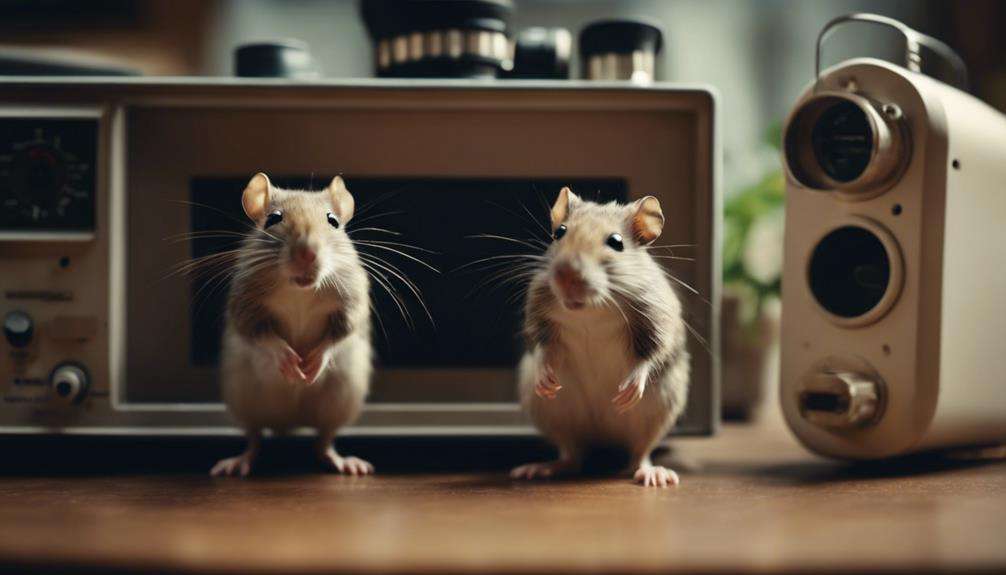
To ensure the well-being and health of your exotic pet rodents, it's crucial to pay close attention to the noise levels in their environment. Monitoring rodent noise is essential for various reasons:
- Early Detection of Respiratory Issues: Changes in noise patterns can serve as an early indicator of respiratory problems in exotic pet rodents, allowing for prompt intervention.
- Stress and Discomfort: Unusual or excessive noise may signal that your pet rodent is experiencing stress or discomfort, necessitating a closer look at their environment or health.
- Signs of Illness or Pain: Monitoring noise levels can help in identifying signs of illness or pain in your pet rodents, prompting timely veterinary care.
- Well-being Maintenance: Regular monitoring of noise levels is crucial for maintaining the overall well-being of your exotic pet rodents, ensuring they're happy and healthy.
Understanding the typical noise behaviors of different rodent species, such as male rats, can also aid in recognizing potential issues related to their middle ear health. Regular observation and attention to noise levels can significantly contribute to the quality of care you provide for your exotic pet rodents.
Frequently Asked Questions
What Do the Sounds of a Pet Rat Mean?
When you listen to a pet rat, observe behavioral cues and communication signals. Sounds like bruxing indicate contentment, while chittering may show excitement. Squeaking while breathing might signal illness, a stress indicator needing prompt attention.
How Do Loud Noises Affect Animals?
Loud noises trigger a stress response in animals, causing behavioral changes and potential hearing damage. Sensory overload can lead to anxiety and health issues. It's crucial to create a peaceful environment for exotic pet rodents to thrive.
What Decibel Level Is Harmful to Mice?
When it comes to mice, noise tolerance is vital. Their hearing is sensitive, and exposure to levels above 85 decibels can harm them. To ensure safety, keep noise below 70-80 decibels in rodent habitats.
Are Rodents Scared of Loud Noises?
When it comes to rodents, loud noises can trigger fear responses due to their noise sensitivity and natural instincts. Such disturbances can disrupt their behavior, causing stress and discomfort. Providing a quiet environment is crucial for their well-being.
Conclusion
In conclusion, ensuring a tranquil environment for your exotic pet rodents is crucial for their well-being. By monitoring and managing noise levels in their habitat, you can create a peaceful space that promotes their comfort and reduces stress.
Remember, a quiet setting is key to a happy and healthy life for these unique companions. So, keep those decibels low and watch your furry friends thrive!
